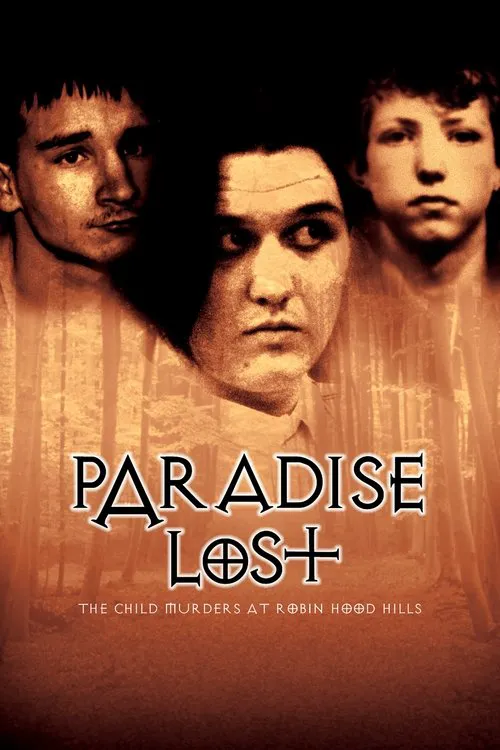Paradise Lost: The Child Murders at Robin Hood Hills

Intrigue
Paradise Lost: The Child Murders at Robin Hood Hills is a documentary-style crime film directed by Joe Berlinger and Bruce Sinofsky. The film revolves around the triple child murder case that took place in West Memphis, Arkansas, in 1993. The crime shocked the nation and led to the indictment of three nonconformist young boys: Damien Echols, Jason Baldwin, and Jessie Misskelley. On May 5, 1993, three-year-old Stevie Branch, eight-year-old Michael Moore, and eight-year-old Christopher Byers disappeared while playing near a creek in their neighborhood. When a search party discovered their bodies, the children were found brutally murdered, with evidence suggesting they had been tortured and mutilated. This led to an immediate investigation and a flurry of public opinion, which largely focused on the three young suspects. Damien Echols, a 17-year-old self-proclaimed goth and outsider in his community, and his two friends, Jason Baldwin and Jessie Misskelley, were arrested in connection with the murders. Despite lacking a clear motive, the prosecution began building its case, focusing on circumstantial evidence, witness testimony, and a peculiar interview with Jessie Misskelley. The interview led to a critical revelation; Misskelley told the police that he had seen the devil in Damien's presence and that the group had planned the murders to appease the devil. This information fueled the public's perception of the suspects as Satan-worshipping, outcasts who had committed the heinous crime. As the investigation gained momentum, the police discovered a series of gruesome details, which further fueled the sensationalism surrounding the case. A torn portion of a pair of black shoelaces near the crime scene initially incriminated Damien, but subsequent evidence showed the laces were actually from a different pair. Furthermore, alleged 'revelations' from Jessie Misskelley implicated the group in the murders, but upon further questioning and reevaluation, his statements began to unravel. Paradise Lost raises crucial questions regarding the legitimacy of the investigation and the reliability of the available evidence. The film also portrays a sense of community outrage, as West Memphis's residents rallied behind the perceived notion that justice was being served. The prosecution, driven by a zeal for conviction, presented a seemingly airtight case against the three young defendants. Damien Echols' defense counsel, Dan Stidham, struggled to combat the prosecution's evidence, but ultimately raised doubts regarding the reliability of key testimonies. The documentary's portrayal of the West Memphis Three's trial is chilling, highlighting a judicial system that appears to lean heavily on the testimony of Jessie Misskelley. Although Misskelley's confessions seemed incriminating at first, they later raised more questions than answers. Misskelley, who had learning difficulties and had been diagnosed with attention deficit hyperactivity disorder, recanted some statements due to the intense pressure from investigators. Jason Baldwin and Damien Echols' families were shocked by the turn of events, feeling that their sons were being wrongly accused. Their reactions were amplified by the perceived bias of the prosecution and local media outlets, which focused largely on sensationalizing the case and portraying the teenagers as Satan-worshipping, child-killing cultists. The film shows footage of a press conference, where a visibly shaken Mary Echols, Damien's mother, expressed her concerns over the handling of the investigation and the biased media portrayals of her son. The trial reached its peak as the prosecution delivered its closing statements. By presenting its case as a simple equation – three outcast teenagers, fueled by Satanism and a twisted desire to kill, brutally murdered the local children – the prosecution seemed to effectively sway the jury's opinion. However, the real-life drama unfolding off-camera suggested otherwise. The community and media began to scrutinize the investigation, with some questioning whether justice had been served. Ultimately, the three trials resulted in guilty verdicts, with Damien Echols receiving the death penalty. In 2010, all three men were released after a successful appeal for Alford plea. Their Alford plea allowed Damien, Jason, and Jessie to maintain their innocence, while also acknowledging the prosecution's evidence against them. Paradise Lost: The Child Murders at Robin Hood Hills raises uncomfortable questions about American justice. In an era dominated by true-crime storytelling, the film provides an unsettling example of the dangers of preconceived notions, sensationalized media portrayals, and a flawed investigative approach. The documentary leaves viewers with an uneasy feeling that, in some cases, the pursuit of justice can become twisted and tainted by the societal biases of a community in the midst of a tragic event. This dark and gripping narrative serves as a poignant warning about the complexities and pitfalls inherent in the justice system.
Critiques
Recommandations




